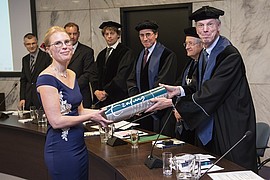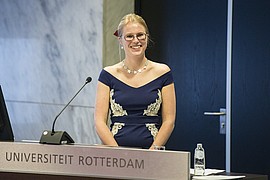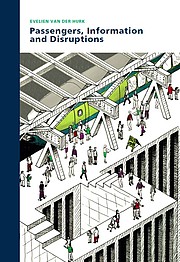PhD Defence: Passengers, Information, and Disruptions

ERIM’s Evelien van der Hurk confronts issues related to disruptions in passenger rail and how information on digital passenger track record data can be used to improve service in her upcoming dissertation, ‘Passengers, Information, and Disruptions’. Evelien maps the complex interactions among passengers and between passengers and schedules in order to detect points of intervention, of which the key forms are re-routing and route information updates. The resultant model was built on data provided by NS (Dutch Passenger Rail) and the Massachusetts Bay Transport Authority.
Evelien defended her dissertation in the Senate Hall at Erasmus University Rotterdam on Thursday, 18 June 2015. Her supervisors were Professor Leo Kroon and Professor Peter Vervest; her co-supervisor was Dr. Gabor Maroti. Other members of the Doctoral Committee included Dr. Dennis Huisman (ERIM), Professor Otto Anker Nielsen (DTU – Institut for Transport), and Professor Nigel Wilson (MIT).
About Evelien van der Hurk

Evelien van der Hurk (1985) has a master's degree in Econometrics and Management Science, specialization Quantitative Logistics and Operations Management, (cum laude) from the Erasmus University Rotterdam. She started her PhD research within the Netherlands Science Foundation (NWO) project `Complexity in Public Transport' in September of 2010 at the Rotterdam School of Management. Her main research interests are in analyzing human behavior based on large data sets and including human behavior in combinatorial optimization models, specifically with the application to resilient network planning and design in transportation. Within her PhD, she has focused on analyzing passenger behavior based on large data sets on passenger journeys, and modeling realistic passenger behavior in decision support models for disruption management in public transport.
In 2013, Evelien visited Prof. Nigel Wilson, Prof. Joe Sussman at the Civil Engineering Department, and Prof. Dick Larson at the Engineering Systems Division, of the Massachusetts Institute of Technology.
The research that is described in this thesis has been presented at many international conferences, such as IFORS, CASPT, TRISTAN and the IEEE Conference on Intelligent Transportation Systems. One of the chapters has been published in IEEE Transactions. Two others are currently under review at Transportation Science.
From April 1, 2015, Evelien will be working as an assistant professor at the Danish University of Technology, where she will continue to work on research in transportation.
Thesis Abstract

Passengers traveling in public transport generate a detailed digital track record of their journey through using automated fare collection systems and carrying mobile devices. This information on passenger behavior has only recently become available to public transport operators. This thesis addresses the question how this new information can be used to improve passenger service in case of disruptions in public transportation.
Major disruptions cause the current logistical schedule of the operator to be infeasible. Adjusting this schedule to the disruption is a complicated planning problem. Passengers will adjust their journeys to the new schedule, and may need to adjust their route choice due to the route choice of other passengers in case of capacity shortages. Therefore the passenger service results from a complex interaction between passengers themselves, and between passengers and the schedule.
This thesis proposes new models for improving passenger service in case of major disruptions by adjusting the schedule while anticipating passenger’s reactions, and also by supporting passengers during disruptions through the provision of route advice. This research is combined with a study on passenger behavior based on the new data sources. The models are evaluated using data and case studies of the passenger rail network of Netherlands Railways and the urban rail network of the Massachusetts Bay Transportation Authority. It was found that indeed this new information, together with the option to provide route advice to passengers, could significantly improve service during major disruptions.
Photos: Chris Gorzeman / Capital Images


